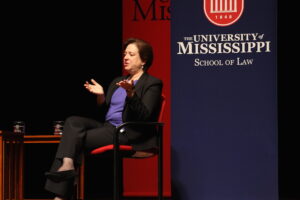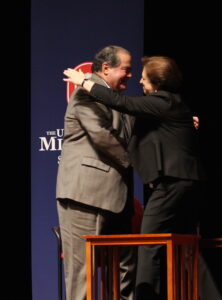
As the students trickled out of Oxford for Christmas break, the first weekday after finals brought two Supreme Court justices to the Ford Center stage in front of a packed house of judges, lawyers, law school students and interested Oxonians.
The University of Mississippi School of Law hosted on Monday an hour-long conversation with Supreme Court Justice Antonin Scalia and Justice Elena Kagan moderated by law professor Jack Nowlin. Filled with questions from Ole Miss law students, the program ranged from advice for students to high points of the justices’ respective careers.
 When asked about their favorite majority opinion or dissents from their time on the bench, Scalia favored his dissent on Maryland v. King, and Kagan said it was one of her favorite dissents to cover in the classroom. The case focused around whether it was constitutional to take the DNA of someone arrested for one crime, run it through a database of unsolved crimes with DNA evidence and see if a match is found.
When asked about their favorite majority opinion or dissents from their time on the bench, Scalia favored his dissent on Maryland v. King, and Kagan said it was one of her favorite dissents to cover in the classroom. The case focused around whether it was constitutional to take the DNA of someone arrested for one crime, run it through a database of unsolved crimes with DNA evidence and see if a match is found.
“Of course, it’s very useful. It would be even more useful if you took everybody’s DNA at birth and put it in this central register. God, that would be useful,” Scalia said. “But the question is whether it’s an unreasonable search and seizure, and Elena and I thought it was to persons not suspected of these other crimes, there’s no basis whatsoever for making that intrusion on that person’s bodily integrity to take DNA.”
Though the two justices disagree on many Constitutional matters, they have a mutual respect for one another and are able to enjoy a friendship and learn from each other while still arguing it out in court. Scalia is a vehement originalist, while Kagan believes some pieces of the Constitution are up for interpretation with the changing times.
“I think there are some parts of the Constitution where the only thing that matters is what they thought back then,” Kagan said. “If the Constitution says you can’t be president until you’re 35, it really does not matter that people have a greater lifespan now and 35 then might be something else today.
 “It is the more open-ended things — the equal protection clause, the due process clause. I think the Framers were wise people, and they wrote them that way for a reason. They wrote them that way instead of a set of specific edicts because they understood what they thought equal protection meant back in 1868 was not going to stay the same and to build a Constitution that truly can last over time, there has to be some kind of flexibility in the joints.”
“It is the more open-ended things — the equal protection clause, the due process clause. I think the Framers were wise people, and they wrote them that way for a reason. They wrote them that way instead of a set of specific edicts because they understood what they thought equal protection meant back in 1868 was not going to stay the same and to build a Constitution that truly can last over time, there has to be some kind of flexibility in the joints.”
Scalia, however, believes interpreting the Constitution is a power not given to Supreme Court justices and the language should be taken as plain text.
“I think that elevates the court to a level it was not meant to have,” Scalia rebutted. “The fundamental of democracy is majority rules, and if you don’t believe that, you’re a monarchist or something. It’s the majority who enacted these provisions in the Constitution and the amendments, and we should give them the meaning the majority understood them to have. When you go beyond that and give them what we think is a modern meaning, it may be better, but it’s not our role.”
When asked about the Supreme Court press corps, Kagan said she believed the group “did a hard job well,” but Scalia had other opinions.
“I dissent. I think they do a lousy job but for the fact you can’t expect them to do any better,” Scalia said. “To understand all is to forgive all, and what they have to do is sell newspapers or sell television shows, and if you really describe what is going on in this case — people don’t want to know that. They want to know who is the good guy, who is the bad guy, and did the good guy win. It’s as simple as that.
 “I gave a speech once on the press coverage at some synagogue in Washington. I never gave another speech about them — they are very thin skinned. They can dish it out, but they can’t take it. When I was speaking, I was saying you can’t really expect them to get down in the nitty gritty and explain to the public what the case is really about. The public doesn’t want to know what the case is about.
“I gave a speech once on the press coverage at some synagogue in Washington. I never gave another speech about them — they are very thin skinned. They can dish it out, but they can’t take it. When I was speaking, I was saying you can’t really expect them to get down in the nitty gritty and explain to the public what the case is really about. The public doesn’t want to know what the case is about.
“You can’t blame them for that, but don’t tell me they’re doing a good job. They’re not doing a good job.”
Both Scalia and Kagan said they stumbled into law school unsure what to do after graduation but quickly fell in love with law. Both justices attended Harvard Law School where Kagan later served as dean.
“The moment I arrived, I thought I had never loved studying something so much,” Kagan said. “There was something about the way it forced you to think and also about the impact it had on the world. The combination of those two things, the mental stimulation of feeling that it mattered made me right away say I’m glad I arrived here.”
Since both Scalia and Kagan were involved in academia before serving on the Court — Kagan at Harvard and Scalia at University of Virginia — Nowlin asked what advice they could give to law students and what they saw had changed since their time in the classroom.
 Kagan focused on the importance of learning from all aspects of school, especially looking beyond books and professors and engaging with fellow students. She also reminisced about her time as dean and the influence she hoped to have on her students.
Kagan focused on the importance of learning from all aspects of school, especially looking beyond books and professors and engaging with fellow students. She also reminisced about her time as dean and the influence she hoped to have on her students.
“What I loved about deaning is you had to do so many different things that every day was really different, requiring you to exercise different muscles, enabling you to learn all kinds of different things,” Kagan said. “I liked that variety of the job, and I loved teaching and students and feeling as though it was really possible to make a difference in my students’ lives. You can influence the way they go through their professional lives for decades.”
Scalia said he recently looked into the Harvard faculty catalogue and was surprised to see less professors with actual real world practice experience heading the lectures.
“A lot of the faculty members were either still engaging in private practice or had been in practice for years. That’s not the case anymore at Harvard and law schools generally,” Scalia said. “I think that’s probably regrettable. The law school academy is growing away from the Bar and closer to the university.”
Amelia Camurati is editor-in-chief of HottyToddy.com and can be reached at amelia.camurati@hottytoddy.com.
